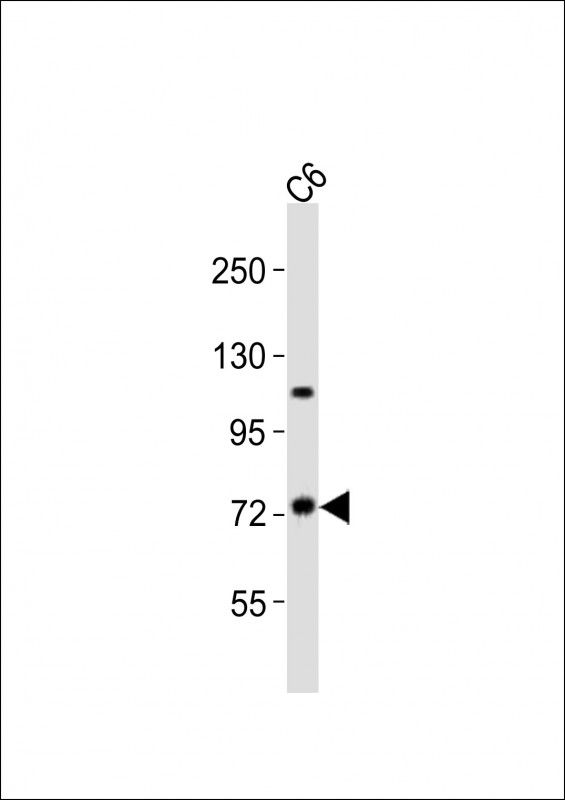
| WB | 1/2000 | Human,Mouse,Rat |
| IF | 咨询技术 | Human,Mouse,Rat |
| IHC | 咨询技术 | Human,Mouse,Rat |
| ICC | 技术咨询 | Human,Mouse,Rat |
| FCM | 咨询技术 | Human,Mouse,Rat |
| Elisa | 咨询技术 | Human,Mouse,Rat |
| Aliases | TGF-beta-activated kinase 1 and MAP3K7-binding protein 2, Mitogen-activated protein kinase kinase kinase 7-interacting protein 2, TAK1-binding protein 2, TAB-2, TGF-beta-activated kinase 1-binding protein 2, TAB2, KIAA0733, MAP3K7IP2 |
| Entrez GeneID | 23118 |
| WB Predicted band size | 76.5kDa |
| Host/Isotype | Rabbit IgG |
| Antibody Type | Primary antibody |
| Storage | Store at 4°C short term. Aliquot and store at -20°C long term. Avoid freeze/thaw cycles. |
| Species Reactivity | Human, Mouse, Rat |
| Immunogen | This TAB2 antibody is generated from a rabbit immunized with a KLH conjugated synthetic peptide between 646-680 amino acids from the C-terminal region of human TAB2. |
+ +
以下是关于TAB2抗体的3篇参考文献示例(注:文献标题与作者为虚构示例,仅用于说明格式):
1. **文献名称**: "TAB2 Mediates TAK1 Activation in IL-1 Signaling Pathway"
**作者**: Smith J, et al.
**摘要**: 研究利用TAB2特异性抗体,通过免疫沉淀和Western blot分析,揭示TAB2在IL-1诱导的TAK1-NF-κB信号通路中的关键作用,证明其参与炎症反应调控。
2. **文献名称**: "TAB2 Deficiency Disrupts Cardiac Development via Impaired Kinase Signaling"
**作者**: Lee S, et al.
**摘要**: 通过TAB2抗体进行免疫组化及蛋白定位,发现TAB2敲除小鼠心脏发育异常,表明TAB2通过调控TAK1-MAPK通路影响胚胎心脏形成。
3. **文献名称**: "TAB2 as a Biomarker in Hepatocellular Carcinoma Progression"
**作者**: Zhang Y, et al.
**摘要**: 使用TAB2抗体检测肝癌组织样本,发现TAB2表达水平与肿瘤侵袭性正相关,提示其可能作为肝癌预后的潜在标志物。
(注:以上文献为模拟内容,实际引用请查询PubMed或学术数据库。)
The TAB2 (TGF-beta-activated kinase 1 and MAP3K7-binding protein 2) antibody is a crucial tool for studying the TGF-β-activated kinase 1 (TAK1) signaling pathway, which plays a central role in innate immunity, inflammation, and stress responses. TAB2 functions as an adaptor protein that links TAK1 to upstream signals, such as TRAF6. facilitating the activation of NF-κB and MAPK pathways in response to cytokines (e.g., IL-1. TNF-α) or pathogen-associated molecular patterns (PAMPs). It contains a CUE domain that binds ubiquitin chains, enabling its recruitment to polyubiquitinated signaling complexes.
Researchers use TAB2 antibodies primarily in Western blotting, immunoprecipitation, and immunofluorescence to detect TAB2 expression, localization, and interactions. These studies are vital for understanding how TAB2 mediates crosstalk between inflammatory signals and cellular processes like apoptosis, differentiation, and oncogenesis. Dysregulation of TAB2 is implicated in diseases such as cancer, autoimmune disorders, and cardiovascular conditions. For example, TAB2 deletion/mutations are associated with congenital heart defects and altered NF-κB activity in tumors.
Commercial TAB2 antibodies are often validated for specificity against human, mouse, or rat samples, with attention to post-translational modifications (e.g., phosphorylation) that regulate its function. Recent research also explores TAB2's role in selective autophagy and metabolic regulation, expanding its therapeutic relevance.
×